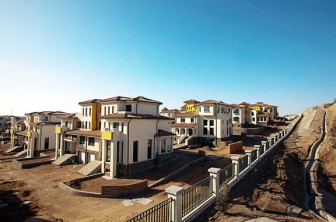ORDOS, China, (Reuters) – The monumental, neo-Mongolian sculptures, empty plazas and hulking concrete shells of buildings in Ordos, deep in the steppes of Inner Mongolia, are a potent symbol of how China’s property boom can turn to bust.

Off the back of a thriving coal industry, the local government has been building a new city for one million people called Kangbashi. It sits virtually empty and property prices are falling.
Even in the old city of Dongsheng where people live and work, some 45 minutes drive away, a wave of investment has backfired. Cranes sit idle over unfinished skyscrapers and migrant workers are fleeing.
The swing in fortune — residents and property agents say prices have dropped by up to a third — is a severe example of what is happening in cities across China, including Shanghai and Beijing.
After a housing bubble that doubled values in 35 cities between 2004 and 2009, prices are now falling nationwide. The central bank said on Friday property prices had reached a turning point while banks are worried a price slide of 20 percent could trigger panic selling.
“People are worried. Especially if they have bought two or three apartments,” said Yu Mingjun, a worker sitting in a down jacket at a ramshackle office of a half-completed project in the old town.
Beside him, a colleague played video games while outside, the few construction workers left on site chatted over a card game.
“Actually I am worried too. I can’t decide what to do. I’m thinking of leaving here.”
Top Chinese leaders have vowed to keep in place measures aimed at clamping down on the country’s property inflation until prices return to reasonable levels.
But prices in Ordos have already fallen below the level that analysts say would cause serious problems if mirrored nationally.
Prices have plummeted 20-30 percent in certain property developments in Beijing and Shanghai.
Nationwide, the decline is so far more modest. Home prices fell slightly in October from September for the first time this year, official data showed, but private surveys indicated prices began falling in September and continued through November.
With local governments often dependent on land sales to fund payments on a staggering 10.7 trillion yuan ($1.7 trillion) of debt, Beijing worries that a collapsing property market will trigger a wave of defaults that in turn will hit the banks.
“If society demonises the property sector, especially if buyers think prices will fall, creating a sharp cooling of for instance 30-40 percent, I think that’s very serious,” said Hui Jianqiang, head of research for consultancy E-House China.
More worrisome, the property market, which contributes about 10 percent of Chinese growth and drives activity in 50 other sectors, could drag the real economy to a hard landing.
A pair of purchasing managers’ surveys last week showed China’s factory output shrank in November to the lowest level in three years, feeding worries about whether Chinese growth can keep powering the global economy.
A “SENSITIVE” PLACE
In empty showrooms of Dongsheng, Ordos’ old city, saleswomen immediately offer 30 percent price discounts if a buyer is willing to pay for a property upfront and in cash.
Chinese and foreign media seized on Ordos as the prime example of wasteful and pointless government projects after the government built the sprawling new city of Kangbashi.
Investors view ghost towns like Kangbashi as an example of the sort of excesses that could pull hard on the reins of the country’s growth.
On Thursday, a policeman shooed a Reuters cameraman away from the Wenming (“Culture”) property development right near government buildings in Kangbashi, as workers bearing shovels walked in to demand their last payment before heading home.
“Kangbashi is a sensitive place now,” he said.
China cut its required reserve ratio (RRR) for banks this week, thereby freeing up more cash for lending. Many interpreted that as a sign that China had swung towards easing, although it remains unwilling to cut interest rates.
“The RRR cut is not a timely enough rain to water the developers’ drying cash flows. But it signals a policy change and could help boost market confidence,” said Zhang Yue, research head of Home Link, a Chinese real estate consultancy.
Many analysts expect Beijing to keep property tightening steps in place, including curbing bank lending to developers. Worried about inflation and a speculative bubble, officials remain wary of relaxing policy.
But local governments may not be able to wait. As developers cut prices, they will see a drop in demand for land sales, which bulk up their budgets. Falling revenues will give them incentive to quietly loosen restrictions on property — such as rules limiting the number of homes families can buy — in their areas.
“China’s severe tightening measures have already reined in property speculation. They have also hurt healthy demand for first homes and second homes for better living conditions,” said
Jiao Qing, president of Beijing Zhongkun Investment Group, a Chinese developer.
“Just like driving, once you have braked hard and brought the car to a sudden standstill, it takes a while to restart the engine.”
QUIET LOOSENING
Governments in Beijing, Wuhan, and Hangzhou — all places with more natural demand than Ordos — have issued policies to help the housing sector in the past two weeks.
In Ordos, the government announced a bailout fund of between 7.5 billion and 10 billion yuan ($1.18 billion to $1.57 billion) to support its beleaguered developers.
Still, that may not be enough. A commercial real estate agent, who only gave his surname Li, said that despite the government actions he was planning to return to his native Guangdong Province after six unsuccessful months in Kangbashi.
“There isn’t much commercial real estate here. You need private businesses for that, and here it’s all government money.”
If Beijing can manage to orchestrate an orderly pull back in prices, policymakers need look no further than Dongsheng as an example of the future of the property market.





